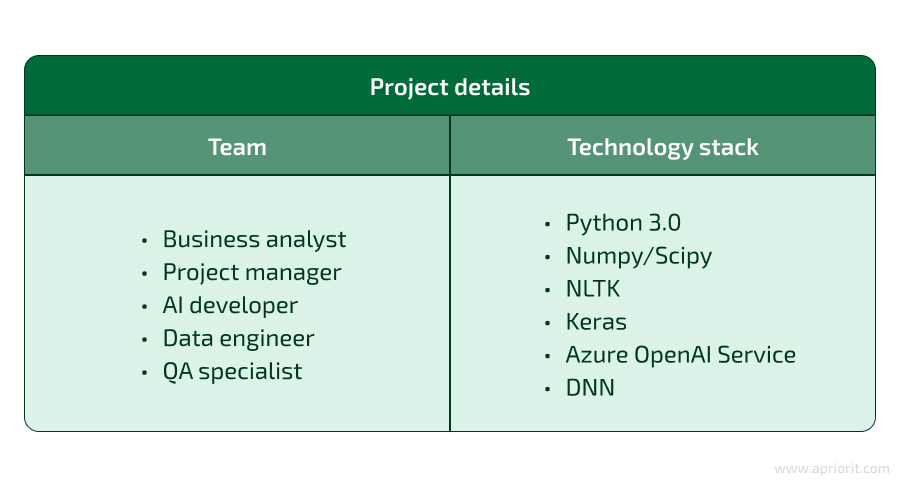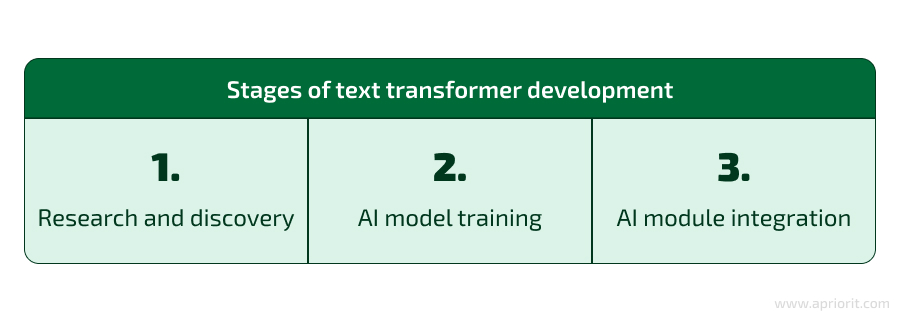Our client is an international provider of content management services. Creators from all over the world use our client’s platform to write, manage, and distribute their content.
To offer an outstanding user experience and greater content management efficiency to their customers as well as to stay competitive in the market, the client wanted to enhance their platform with advanced content processing capabilities powered by artificial intelligence (AI). To achieve this goal, they asked Apriorit to build an AI text processing feature for their platform.
For the new feature to meet all of the client’s expectations, the Apriorit team implemented three AI-powered modules to translate, generate, and format text in response to a user’s prompt. Our team also assisted the client with integrating these modules into their platform.
The client
Our client is an international content management services provider. They empower creators around the world with a comprehensive platform for writing, managing, and distributing content.
The challenge
The client wanted to enhance their platform with new AI-based text processing functionality for running various tasks upon a user’s request. They were looking for a team of competent AI software engineers who could build and train the necessary AI models and integrate ready features into the platform.
Want to enhance your product with AI?
Tell us about the capabilities you want to add to your software and let’s discuss how we can make them real!
Our approach
Apriorit established a dedicated team to analyze possible implementation options, finalize project requirements with the client, and build the actual solution. After discussions with project stakeholders, we decided to build three modules — for AI text translation, text generation, and text formatting.
Our team consisted of a business analyst, project manager, AI developer, data engineer, and quality assurance specialist. While working on this project, the team relied on a broad selection of technologies including Python 3.0, Numpy, Scipy, Natural Language Toolkit (NLTK), Azure OpenAI Service, DNN, and Keras.

The result
The Apriorit team created three powerful text processing AI modules for translating, formatting, and generating texts. We integrated those modules into the client’s platform, ensuring stable platform performance and a flawless user experience.
Satisfied with our cooperation, the client now wants the Apriorit team to assist them with implementing the new platform upgrade — a feature for transforming text to images.
How we did it
The project was executed in three large phases:

1. Research and discovery
First, an Apriorit business analyst assisted our client with finalizing their vision of the platform upgrade. After analyzing the market and discussing the client’s ideas, it was decided to implement three separate AI-powered modules, each responsible for a separate function:
- Text translation
- Text formatting
- Text generation
Once we clarified what specific AI-powered capabilities the client wanted to add to their platform, we moved to choosing a fitting technology stack and polishing project requirements.
To speed up development, we suggested using an existing large language model (LLM) that could be trained with the client’s data. After evaluating available options — Falcon LLM, Cerebras LLM, Vicuna, and Azure OpenAI Service — we decided to go with Azure. Being a closed-source LLM, Azure OpenAI Service offered stronger data privacy than any of the other open-source options we considered.
2. AI model training
Using the selected LLM as a starting point, our team designed and trained three AI-powered modules. We used slightly different approaches for each module depending on the task it was meant to tackle.
For the text translation and localization module, Apriorit AI specialists created a DNN-based encoder–decoder trained on multi-language datasets. To build this sequence-to-sequence translation model, we used technologies like Python 3.0, Numpy, Scipy, NLTK, and Keras. The model was trained on two datasets — Workshop on Machine Translation and International Workshop on Spoken Language Translation. We worked closely with the data used for training the AI model and fine-tuned the model to ensure its efficient and stable performance.
To evaluate the performance of the ready model, Apriorit specialists used several metrics, including BiLingual Evaluation Understudy (BLEU), the Metric for Evaluation of Translation with Explicit ORdering (METEOR), and the Translation Edit Rate (TER).
For the AI text formatting module, the Apriorit team composed a custom dataset with 1,000 pairs of plain and formatted texts for the LLM to learn formatting nuances and approaches. Metrics used to evaluate the performance of this model included Recall-Oriented Understudy for Gisting Evaluation (ROUGE) and Perplexity.
For the AI text generation module, Apriorit’s AI engineers trained the LLM to operate similarly to services like Bing chat and evaluated its performance using the Accuracy and F1 metrics. The resulting module can generate responses to a user prompt using both user-inputted data and information from the web.
Related project
Building an AI-based Healthcare Solution
Our client wanted to enhance VAD platform security and performance by adding new capabilities to their platform and needed quality support for existing features.
3. AI module integration
Once all modules were trained and fine-tuned, they were integrated into the client’s platform. To ensure seamless integration and stable platform performance, we ran additional testing. After addressing detected issues, we were able to ensure the desired level of performance and present the client with a satisfying result.
Throughout the project, we worked in close collaboration with the client’s in-house development team to ensure seamless integration of ready functionality into their platform. Our teams synchronized their efforts during regular meetings, while stakeholders received project updates via weekly reports.
The impact
As a result of collaboration with Apriorit, the client was able to enhance their existing platform with three powerful AI-based modules. Introducing new functionality to their platform allowed our client to gain a competitive advantage in their niche. Thanks to stable performance and high accuracy of the implemented modules, the client also ensured a better user experience for their customers.
Satisfied with the results of our work, the client decided to continue their collaboration with Apriorit. Currently, we are working on implementing a new feature for their service — an AI text transformer for turning user-written text into an image.





